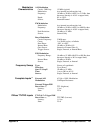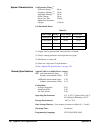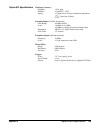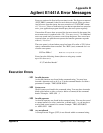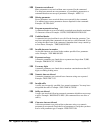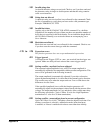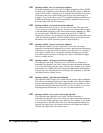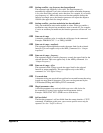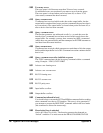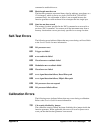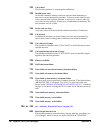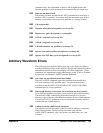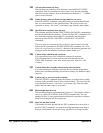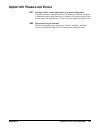
Agilent E1441A Error Messages 145
Appendix B
-221 Settings conflict; stop frequency has been adjusted
The requested stop frequency is not valid. The stop frequency is
automatically adjusted if you select a function whose maximum frequency
is less than that of the currently active function. For example, if you set the
stop frequency to 1 MHz in the sine wave function and then change the
function to triangle wave, the function generator will adjust the output to
100 kHz (the upper limit for triangle waves).
-221 Settings conflict; previous modulation has been disabled
Only one modulation state can be enabled at a time. When you enable a
modulation state, the previous modulation state is turned off. For example,
if
AM is on and then you enable FM, the function generator will turn off AM
first.
-222 Data out of range
A numeric parameter value is outside the valid range for the command.
Example: BMOD:NCYC -3 or FREQ 16 MHZ
-222 Data out of range; amplitude
The requested output amplitude exceeds the upper limit for the selected
function. This error applies only to the APPLy command. See “Output
Amplitude”.
-222 Data out of range; frequency
The requested output (or carrier) frequency exceeds the upper limit for the
selected function. This error applies only to the APPLy command. See
“Output Frequency”.
-222 Data out of range; offset
The requested offset voltage exceeds the upper limit for the selected
function or output amplitude. This error applies only to the APPLy
command. See “DC Offset Voltage”.
-223 Too much data
A character string was received but could not be executed because the string
length was more than 60 characters. This error can be generated by the
CALibration:STRing and DISPlay:TEXT commands.
-224 Illegal parameter value
A discrete parameter was received which was not a valid choice for
the command. You may have used an invalid parameter choice.
Example: DISP:STAT XYZ (XYZ is not a valid choice).
-330 Self-test failed
The function generator's self-test failed from the remote interface (*TST?
command). In addition to this error, one or more specific errors may be
reported. See also “Self-Test Errors,” .



